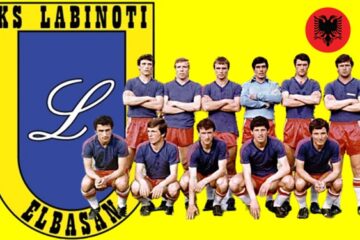Football in the Olympics | Anverse 1920 – A final never finished!

Sports Vision in the Column: “Events from the Football fields.
History of champions with no similarities to each other”.
It’s the Olympic Games and in the football tournament Belgium and Czechoslovakia are in the final for the gold medals. A Prague flag is violently pulled down and torn to pieces! The war seemed to have ended for two years, but it still felt that everything was not over yet. The injuries, the pain, and the anger accumulated in those 4 years, were not exhausted even after the Peace Treaty, Eh, what peace?!
The document signed in Versailles, had spread the blame and imposed sanctions, instead of building balance between the countries of Europe. That treaty had created causes for the birth of a new world war, even more destructive than when it was decided, in more or less the next 20 years. And then there was the propaganda machine that, in this climate filled with injuries and hatred, had never stopped exaggerating things, making the small big and hiding the truth and adding other pains.
The 1916 Olympic Games were scheduled to take place in Berlin. However, their organization could not be stopped with the outbreak of the first world war in the summer of 1914, because here in the heart of a Europe torn apart by conflicts that had deep and intertwined roots just like those of a centuries-old tree, the perception was that the great collision would soon come, and that it would not even have lasted for the time needed to systematize things in the right place.
In Europe, there were no governments and opinions that predicted that the conflict would be short and successful in settling things. However, it didn’t happen like that. On the contrary, it was not short and “successful” to put things in place, but it had laid the foundations of conflict and hatred in the hearts of many people. When the world would find out, the Berlin Games would be cancelled. The motto that quoted “Participation is more important” would have the effect of joining the Antwerp Olympics in 1920. Belgium, and above all Antwerp, were not places like others when it came to the First World War. It happened in the first weeks of the conflict when Germany decided that in order to attack France, it had to pass through the territory of neutral Belgium with its army.
In fact, France and Germany had thousands of kilometers of dividing border between them, so they could very well settle their accounts without involving a third country in this matter. All the more so that a neutral country like Belgium could not allow its neighbor at war to pass through its territory, right next to the windows of its house. Only then, when Belgium answered “no, such an action can never be done”, the harsh reaction of Germany was what could be imagined, because the objective, as everyone knew, was not the shortest way to Paris, but to occupy the positions in the English Channel, in front of the coast of the English “enemy”. However, the small neutral country was invaded and the city of Anvers, which with its fortification represented one of the bastions of national defense and security, fell. In this regard, historiography will use a very harsh definition to describe the event: “The Rape of Belgium”! On the side of the occupying Germans, there were also the soldiers of the Austro-Hungarian Empire, and these were not only Austrian and Hungarian, but they came from every part of this empire, which in itself was a mosaic of languages and nations. But the most important thing for our story is that in the fall of 1914, Antwerp and Belgium were already at the disposal of Germany and the Austro-Hungarian Empire.
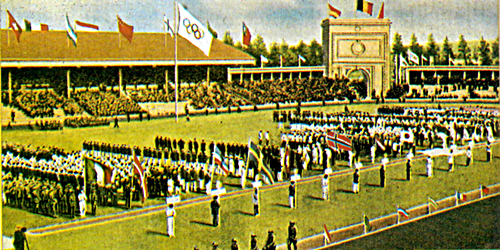
PHOTO FROM THE OPENING CEREMONY OF THE 1920 OLYMPIC GAMES IN ANTWERP
In Antwerp, in the summer of the 1920 Olympic Games, six years after those historical facts, no one had forgotten. Germany and Austria had lost the war and as losers they had been forced, perhaps even formally, to bear the responsibility for having provoked the conflict. For this reason, athletes from Germany and Austria, Hungary and even Bulgaria and Turkey were left out of these Olympic Games. On the map of Europe, Germany and Austria were not with that empire before the war. Austria and Hungary disintegrated and several states were “born” in their territory. Thus, the “newly born” Czechoslovakia was invited to the games. Czechoslovakia had not been the one that had attacked Belgium and Antwerp in c. 1914, however, her fellow citizens had participated and fought on the opposite side of the invader. And this constituted an original sin, which no baptism, forgiveness, or washing could be able to erase.
The world will be informed exactly on the day of the grand final of the football tournament in these games. II Belgium – Czechoslovakia, a challenge that “threw salt” in a wound that has never been closed. Not only the World War, but also the Antwerp Games were extended more than expected. The races dragged on for about 5 months! Among which in closing were the matches of the football tournament. Czechoslovakia was the surprise that was able to advance to the final. Precisely because it was a new team, and because it was the first time it appeared in an international tournament. Czechoslovakia belonged to that school of football in Central Europe that had produced promising talents and a beautiful game. And precisely in this tournament, she had shown an efficient but physically demanding football. In the first stage of the tournament, it had not for nothing defeated Yugoslavia 7-0; 4-0 Norway and 4-1 France.

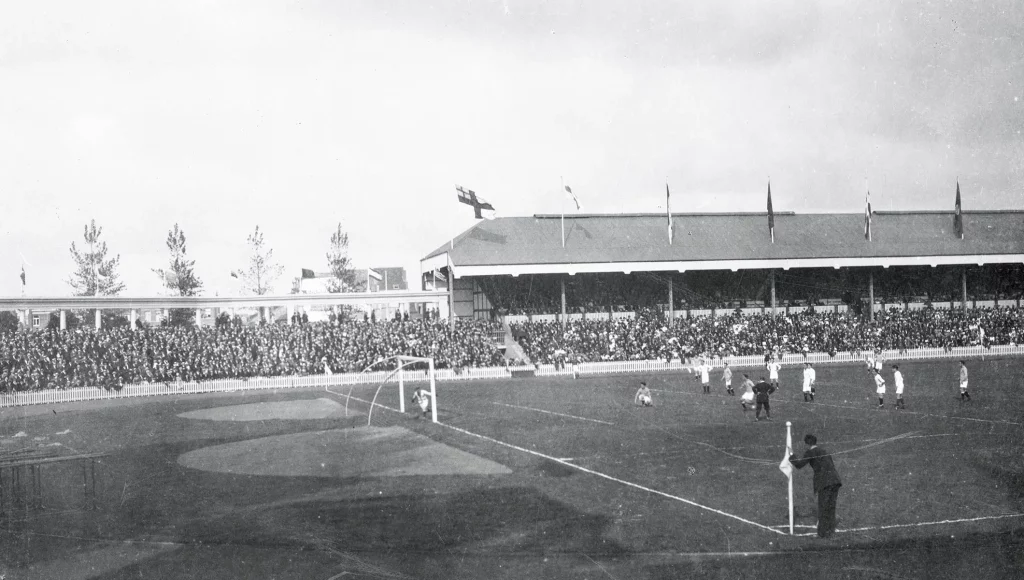
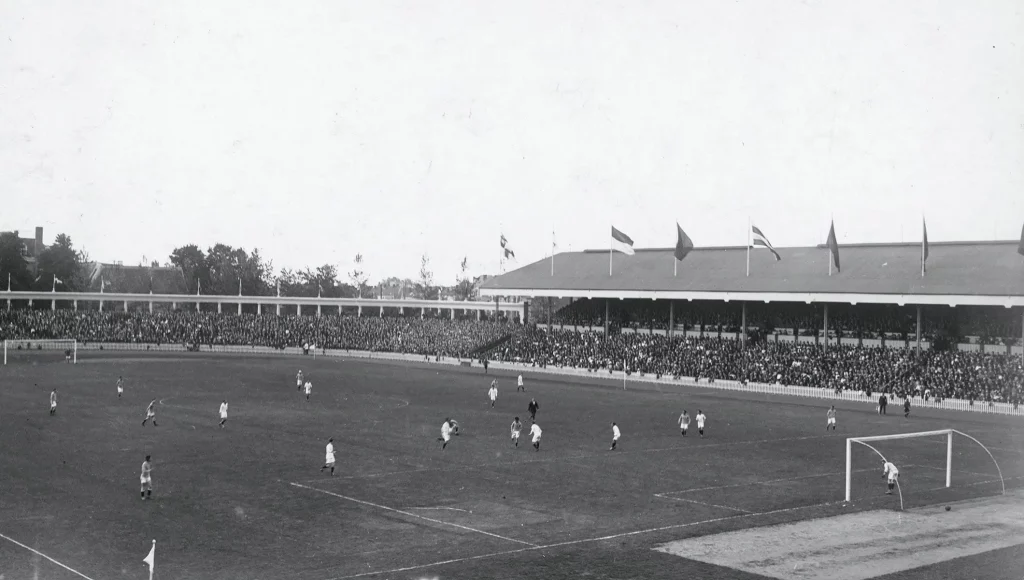
Aspects from the matches of the Olympic tournament – Antwerp 1920
This harshness had somehow rekindled in the local Belgian public the memory of the soldiers of the central empire who in 1914 had violated neutral Belgium and surrounded Antwerp. The idea of a victory for Belgium against Czechoslovakia had taken the form of a revenge on the football field. This seemed clear because among those people who had suffered the aggression, the anger was very great. The newspapers, which have not forgotten the art of propaganda during the war, began to trumpet again: “It is not taken into account that Czechoslovakia is not exactly the aggressor country, but the people who were part of that empire in central Europe…”
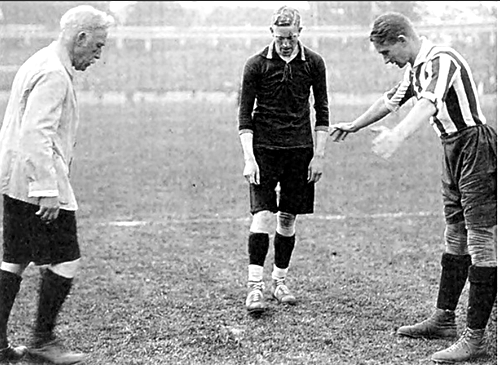
Referee Luis and the two captains of the teams.
One John Lewis, of English nationality, a quiet gentleman, 65 years old, who in his career, among others, was the manager of a international pre-Olympic match, a little while ago, exactly in Prague, where he was physically attacked by local supporters. Therefore, the Czechoslovaks downplayed his candidacy in the final, claiming that the judge Luis will not be able to direct the match objectively. A match that had culminated with an aggression, but the lonely John Luis somehow got through it thanks to his legs, not so fit but responding well to the instinct of survival. For the Czechoslovakian team, it is clear that the climate of the environment there is not exactly that of the Olympic spirit, or perhaps in the sense that for Czechoslovakia, the only thing that matters is the participation, that in order to win, the factors and opportunities appear few.
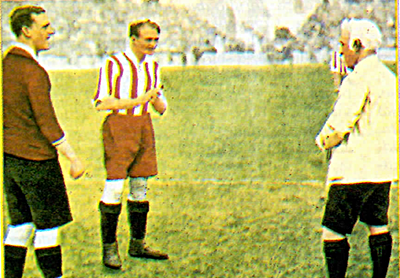
The referee of the final match, the Englishman Luis, is discussing with the two captains of the teams.
On September 2, 1920, in Antwerp, in the stands of the stadium with a capacity of 40,000 seats, Gjon Langenus is also present, who will enter history because in 1930 he will be the referee of the first World Cup final in Uruguay. He will be the one who will tell something about this match: “The fans managed to overcome the obstacles. They were much more in number compared to the capacity of the sports facility, and that’s why they poured onto the track around the boundaries of the field.” In fact, the stadium was filled to capacity two hours before the start of the final.
A protective cordon with armed soldiers is immediately created. Their task was to precisely stop the crowd of people from entering the field of play. In reality, the Belgian soldiers, who were the same ones who until recently had fought against the German and Austrian soldiers, are not limited to keeping order only by using the force of their uniform. Whenever a Czechoslovak player is ready for a shot, they insult and mock or even worse, point the barrel of the rifle in their direction, to make them understand the surrounding climate. In such an environment, there is nothing unexpected, when in the 6th minute, Belgium takes the lead with Robert Coppee. 1-0! It was a penalty that, according to the Czechoslovaks, was signaled by an unclear decision (so to speak) by Mr. John Lewis!
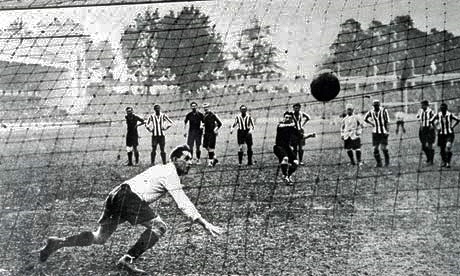
Belgium’s first goal scored with a penalty.
From this moment the game became tough, heavy, grueling, full of anger and revenge, while the public encouraged their favorites to extremism. The referee tried to “suppress” the harshest, most obvious cases while the Czechoslovak captain, Karel Kada, one of the greatest central midfielders in history, protested strongly several times. Then comes the second goal by Rick Larnoe, who was always in an offside position according to the players of Czechoslovakia! 2 – 0!
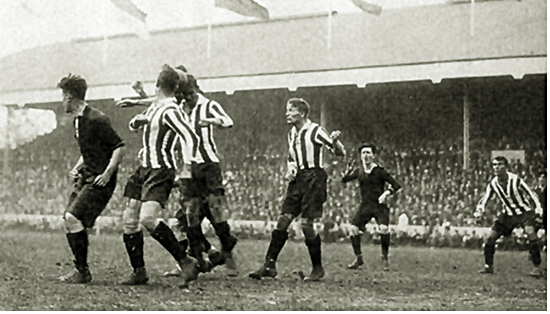
Highlights from the final – 1920 Belgium – Czechoslovakia 2-0
The Belgians doubled their lead after 30 minutes amid cheers from the crowd and the game seemed to be heading towards an acceptable level of normalcy, when the inevitable happened. The worst happened in the 39th minute of the first half. This time there is no goal, but an exclusion of the star of Czechoslovakia, Karel Steiner, for a foul in midfield! There were still six minutes left in the first half when striker Coppee, in a sprint with the ball, was hit hard by Steiner and fell to the ground dramatically, as if he had been electrocuted. The crowd erupts into a schizophrenic uproar….
The referee waves the check away without hesitation. Meanwhile, Karel Kada protests again and clashing again with the referee’s indifference, has lost his cool reason, deciding to follow Steiner to the dressing room. It was like a signal: the other nine visiting players followed their teammates, leaving the field together. Chaos reigned at that moment. Spectators climbed over the surrounding barriers and invaded the field. Some took the Belgian players on their shoulders and led them to triumph, others went after the Czechoslovak players, who under the protection of military security personnel managed to arrive unharmed in the dressing rooms. The Czechoslovakian team decided that now is the moment to stop playing, to abandon the match with this pantomime. According to them, it is more dignified to return to the dressing rooms and immediately to their homes. Meanwhile, some Belgian soldiers run towards the surrounding wall of the stadium, and as if nothing is wrong, they throw down the flag of Czechoslovakia, which flies next to the flag with five rings of the Olympic Games, which symbolizes the union of peoples through these games. What followed did not contain so much of the Olympic culture and spirit.
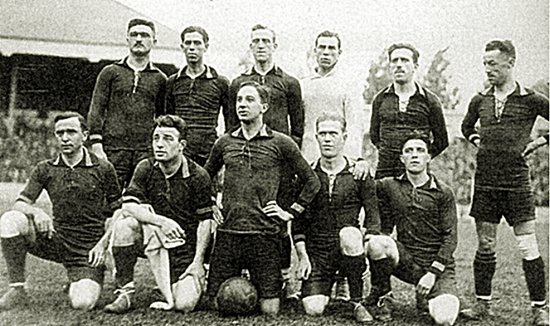
Belgium – Gold Medal Winners, 1920 Top from left: Swartenbroecks/Fierense Hanse / De Bie / Musch / Verbeeck Bottom from left: Van Hegge / Copee / Bragard / Larnoe / Bastin.
The Belgians were declared the winners. While the organizers, in order to evaluate the winners of silver and bronze medals, decide to consider some consolation matches as an additional tournament. Thus, it was agreed that two of the four losers from the quarter-finals would meet the two losers from the semi-finals, so that they could play a final for second and third place. While the final match will never be restarted, ever, since at the request of Czechoslovakia, and leaving the field completely arbitrary in the eyes of the organizers of Antwerp 1920, it was considered as a betrayal of the unwritten rule according to which, the most important thing is to you participate (important is not to win but to participate).
No one wants to say anything about Czechoslovakia, who, on the contrary, consider this final of this tournament never finished. A match never finished! Always there, suspended “in the air” together with the strong taste and anger, just like the end of the First World War, with the Versailles peace treaty, which instead of looking for the reasons for coexistence, on the contrary, had applied the reason of of the strong defeating the weak, while even the big winners had benefited from the little ones! Because of this, no one knew that the war would return 20 years later. The conflict had not ended but was only interrupted, just like the small final of that small Olympic tournament that was organized in the small country of Belgium. Final not closed…. 1920
OLYMPIC TOURNAMENT
SEMI-FINALS SCHEDULE – 1ST PLACE FINAL
September 2, 1920 – “Olympisch Stadium”, Antwerp
BELGIUM – CZECHOSLAVA 2-0
Scorers: Coppee 6′ pen, Larnoe 30′
Belgium : De Bie, Swartenbroecks, Verbeeck , Musch, Hanse(cap), Fierens, Van Hege, Coppee, Bragard, Larnoe, Bastin
Cekoslavakia: Klapka, A. Hojer, Steiner, Kolenaty, Kada(cap), Seifert, J. Sedlacek, Janda, Pilat, Vanik, Mazal
Referee of the match: John Lewis (Inghilterra)
To be noted: The match was suspended in the 43rd minute due to the withdrawal of the Czechoslovak team from the field
By Pjerin Bj | The exclusivity on this page is dated February 27, 2024
_________________
Sports Vision + / The Hour of The Champions since 2013.
Information and references used building this article: The Complete Book of the Summer Olympics / 2000 / Wallecisky D. / pag. 490 | The show “Numeri Uno” on RadioRai / Personal collection of the magazine “Calcio 2000″/N. 33 / August 2000 / “Calcio alle Olimpiadi” Prima puntata – pag.88-117 / Photos: Calcio 2000 and courtesy of Google
Discover more from Sports Vision +
Subscribe to get the latest posts sent to your email.


